The American Commodore Perry visited Macau in 1854 during which time he kept a journal. His recollections were later published as the Narrative of an American Squadron to the China Seas and Japan. The following article is a description of various aspects of life in the territory. The exerpts from the journal have been selected by Father Manuel Teixeira.
THE DECLINE IN COMMERCE
In his Narrative of an Expedition of an American Squadron to the China Seas and Japan, the American Commodore, Matthew Calbraith Perry made the following observations:
"The Commodore's residence in Macao gave him the opportunity of extending his observations of that place, beyond what had been offered by his previous casual visit.
Macau, once so famed for its extensive and profitable commerce and for its wealth, is now entirely divested of them, and seems to be sustained only by a small coasting trade, the expenditures of a limited garrison, and those of the families of the English and American merchants who make it a summer resort, and, having an abundance of money, freely disburse it. The Portuguese jurisdiction is confined within very narrow limits. The Chinese settlements seem to be fast absorbing the whole place; in fact the larger portion of the population of the town is already composed of Chinese men and women, who perform most of the menial duties in the domestic establishments, both of the Portuguese and of other foreigners.
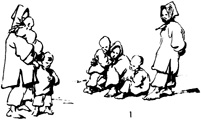 1- Ferrywomen with children (1835)
1- Ferrywomen with children (1835)
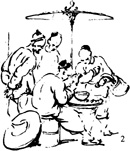 2- Gamblers (1842)
2- Gamblers (1842)
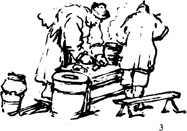 3- Street stall selling food (1835)
3- Street stall selling food (1835)
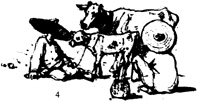 4- Herdsmen with cattle
4- Herdsmen with cattle
The Chinese are also the shopkeepers, the mechanics, and the market people. What the native Portuguese have to do it would be difficult to conjecture. They are, with some exceptions of wealthy merchants, mostly very poor and too proud to work; there are a few, however, who are employed as clerks in the various foreign mercantile houses, while the greater portion spend their time in idleness, living upon the remnants of the once princely fortunes of their ancestors, and still occupy, in beg garly poverty, the stately mansions erected in the olden time of Macao's splendid prosperity.
There is still a show of military possession on the part of the Portuguese, who hold the surrounding hills, covering the city with fortified works, constructed after the fashion of the seventeenth century. These seem quite sufficient to keep the Chinese in due awe, who, if they had the least energy, could easily dislodge the Portuguese, for whom they have no great affection, and might drive them altogether from the country.
The Portuguese garrison consists of about two hundred regular soldiers and as many local militia, all of whom are under excellent discipline, and better dressed and more orderly men are seldom seen.
It will be recollected that the English East India Company, before the abolition of its charter, made Macao a sort of entrepot for its China trade, and some of the finest residences were erected by that munificent corporation, or by the ostentatious Portuguese in their days of wealth and prosperity.
One of these magnificent dwellings, with a garden of more than an acre in extent, tastefully laid out, and still kept in order at considerable cost, could be hired, at the time of the Commodore's visit, for the small sum of five hundred dollars a year; and this place has the additional advantage of the romantic association with the name of the poet Camões, it having been his favourite resort, and the spot upon which, as the reader has already seen, a monument to his memory has been erected.
It was from Macao, in the days of its opulence, that many of the commercial expeditions of the Portuguese were dispatched to Japan; and at Macao, too, the Church of Rome had one of its most powerful ecclesiastical establishments, sustained by the dread might of the Inquisition, which in former times, exercised in the East the full force of its dark and cruel discipline.
Now, however, the opulence and enterprise of its merchants are gone, and the awful dominion of the haughty ecclesiastics and their bloody tribunal has lapsed into the weak hands of a few impoverished priests, who meekly appeal to the pity, and barely live upon the bounty, of the reduced Portuguese population.
Since the construction of vessels of greater draught than those of former times, few that visit Macao can enter the inner harbor; it, however, is sufficiently deep for those vessels engaged in the coasting trade, sailing under the Portuguese flag, and called Lorchas, which are a sort of nondescript of curious rig and construction. The Chinese junks are also enabled to enter the inner port, as are occasionally a brig or schooner. The storeship Southampton, drawing thirteen and a half feet, anchored inside. Thirteen, and at high tides fourteen feet can be carried into this inner port, and about as much into a small harbor opposite the city, called the Typa.
It was in the Typa that the Portuguese corvette, Don John the Second, was lying when blown up, when the United States sloop-of-war Marion, being at anchor near by, rendered much service. The Portuguese ship is generally supposed to have been blown up purposely by the gunner, who had been punished in the morning by the captain for neglecting some necessary preparation to do honor to the day, which was some national anniversary.
Ships of war and large merchant vessels, resorting to Macao, anchor... in the road, at a distance of from three to five miles from the city; this makes the communication with the shore at all times inconvenient, and in blowing weather altogether impracticable.
This, together with other reasons, prompted the Commodore to recommend the removal of the naval depot to Hong Kong. Commodor Perry, on this subject, gave his views at length, in a communication to the Secretary of the Navy. He there stated that, in consideration of the inconvenience and consequent delay, with the increased expense of landing and shipping at Macao, articles sent from the United States for the use of the squadron, and especially the coal, that he at once saw the necessity of having a depot at Hong Kong, which had originally been the naval station. At the time of the agitation of the Oregon question, a rupture had been supposed to be imminent with Great Britain and it had been removed.
No such troubles now threatening, there could be no doubt that government property would be safer in Hong Kong than in the badly defended town of Macao. Hong Kong has all the advantages of anchorage, as vessels of the largest size can be moored in smooth water, within seven hundred yards off the land, allowing the conveyance of articles of all kinds, in all weather, with great facility, from shore to ship, and ship to shore.
The only objection urged against Hong Kong was its unhealthfulness but this did not apply to those afloat, who were exempt from the evil effects of the injurious causes which prevailed on land. Hong Kong has the additional advantage of being the market for all the various provisions which may be required by a naval squadron, and has conveniences for the refitment and repair of vessels. Pending the action of the naval department, the Commodore made very necessary preliminary arrangements by obtaining depots for coal and other supplies at Hong Kong, and then ordered the coal vessels and storeships to discharge their freight at that port.
The Commodore found Macao an exceedingly agreeable place of residence, as the picturesque beauties of the country were full of interest, and the town, with its pleasant foreign society, presented many attractions. During his stay there he made the acquaintance of many of the residents, among whom were the families of several of the Canton merchants having summer establishments at Macao to which they are accustomed to retire during the hot months, and where they exercise the kindest and most liberal hospitality.
Monsieur Bourboulon, the French minister to Canton, had a residence at Macao, and with his wife, an American lady, whom he married while secretary of a legation at Washington, contributed much toward heightening the charms of social intercourse.
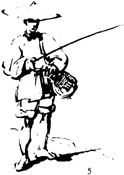 5 - Fisherman with rod
5 - Fisherman with rod
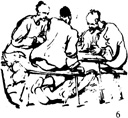 6 - People at a table (street fortune-teller?) (1836)
6 - People at a table (street fortune-teller?) (1836)
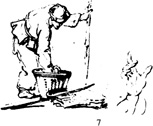 7 - Fisherman with bamboo rod
7 - Fisherman with bamboo rod
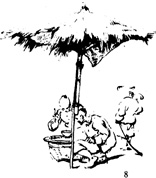 8 - Gamblers
8 - Gamblers
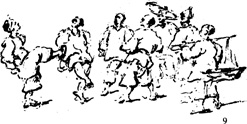 9 - Figures (servant, street vendor?) watching a group playing Tek-Hin, a traditional street game in Macau consisting of kicking a shuttlecock into the air
9 - Figures (servant, street vendor?) watching a group playing Tek-Hin, a traditional street game in Macau consisting of kicking a shuttlecock into the air
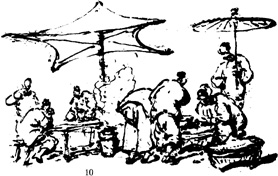 10 - Street restaurant (1843), to the side, street vendors and a lady shaded by a servant holding a parasol
10 - Street restaurant (1843), to the side, street vendors and a lady shaded by a servant holding a parasol
The French Commodore, Monsieur de Montravel, came with his squadron and anchored in the outer road, and Commodore Perry had an opportunity of forming his acquaintance and of interchanging with him, as well as with Monsieur Bourboulon, and, indeed, with all the principal residents of Macao, those acts of hospitality and kindness which are invariably allied to a just appreciation of mutual courtesy.
With Governor Guimarães, an officer of the Portuguese navy, whom the Commodore had met before on the coast of Africa, there were the most friendly and intimate relations, as well as with Captain Loreiro, of the same service; and it is due to both these officers to acknowledge their courteous deportment in the course of all the official transactions with them.
The utmost good feeling prevailed in the intercourse with Sir George Bonham, the British Superintendent of affairs in China and governor of Hong Kong, and with the military and naval commanders-in-chief, as well as with the mandarins of the country and the local authorities."
INCIDENTS CONCERNING THE ENGLISH
"Two events occurred in 1849 at Macao, during the administration of the Portuguese Governor Amaral, an officer of distinction and universally esteemed, which, although they were published at the time of their occurrence in the Hong Kong newspapers, are still so strikingly illustrative of the fallen fortunes and depressed national character of the Portuguese, that it may not be amiss in this place to relate them. The first event alluded to, grew out of one of those acts of folly which are sometimes exhibited by the ill-regulated enthusiasm of fanatics in foreign countries, where the religion happens to differ from their own.
A young Englishman, attached to a missionary school in Hong Kong, made a visit to Macao, and shortly after landing he espied one of those religious processions so common in Roman Catholic countries, in which what is called the Host is conducted through the principal streets, attended by numerous priests and others in full costume, with lighted candles, the swinging of censers, and all the rich display of Romish ecclesiastical ceremony. This young man, on seeing, for the first time, perhaps, this singular exhibition of what seemed to him nothing but an insult to true Christianity, and making, probably, not sufficient allowance for differences of opinion and religious belief, and for the sincerity, however mistaken, of those of another faith than his own, conceived the idea of showing his contempt for such pageantry. He accordingly placed himself conspicuously in the way of the procession, and refused to take off his hat when the Host passed. This act, if unwilling, from conscientious motives, to perform, he might have easily avoided by turning away and passing down another street. Many Protestants in Romish countries do so. The young man, however, did not act in this very obvious and simple manner, by which he might have readily saved his conscience and allowed others who differed from him to act in accordance with their views. When the Englishman was observed purposely standing in the way of the procession and covered, he was mildly requested by the priests to take off his hat, or move away; but so far from complying with this request, the young enthusiast pressed his hat closer on his head and stood his ground like a martyr. He was now warned by the armed police to uncover or to retire, but being still obstinate, notwithstanding this summons, he was arrested and taken to the guard-house. Here now was a catastrophe, one of her Majesty's subjects shut up in a Portuguese guard-house.
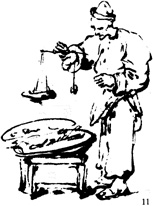 11 - Vendor holding a traditional hand scale
11 - Vendor holding a traditional hand scale
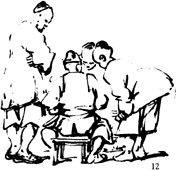 12 - Gamblers (1836)
12 - Gamblers (1836)
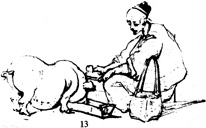 13 - Man with a pig
13 - Man with a pig
The indignation of Captain Keppel, commanding the British man-of-war Dido, then at anchor in Macao roads, was greatly aroused, and a demand was immediately made upon Amaral, the Portuguese governor, for an unconditional surrender of the Englishman. The governor asked for a short delay, for the purpose of consulting the ecclesiastical council. In the meantime, a regatta of boats belonging to the United States ship Plymouth and the vessel commanded by Captain Keppel, who had been appointed one of the judges, was to take place. Governor Amaral and many of the garrison officers were also to be present on the occasion. The day arrived, and Captain Keppel quietly withdrew himself from the place, and with a party of marines and some volunteer officers left the outer roads, the scene of the regatta, pulled on shore, and landed opposite the house of Mr. Patrick Stewart, and thence passing through an unoccupied house and garden, in order to avoid the main street, came suddenly upon the guard of the garrison, and rushing upon the sentinel, rescued by force the Englishman, whose ill-timed enthusiasm had brought about this military outrage."
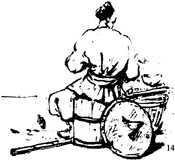 14 - Vendor sitting (1842); beside him is his tudum, a typical hat for the servant and coolie classes
14 - Vendor sitting (1842); beside him is his tudum, a typical hat for the servant and coolie classes
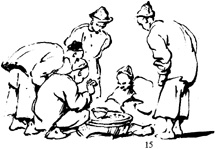 15 - Group of gamblers taking a bet (1843)
15 - Group of gamblers taking a bet (1843)
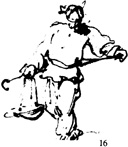 16 - Street vendor with scales
16 - Street vendor with scales
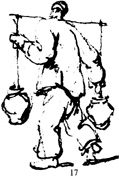 17 - Oil seller
17 - Oil seller
THE ASSASSINATION OF GOVERNOR AMARAL
"The second incident, to which allusion has been made, was one of equally surprising character, and resulted in the death of the governor. It appears that Amaral was a man of great energy, and ambitious of improving the town of Macao by opening carriage roads through and about its limited space. In the governor's attempts to effect these improvements, he was charged by the Chinese with desecrating their ancient burial places. He had received several obscure hints to the effect that his life was in danger, but paid little attention to them. In accordance with his usual practice, he was riding in the afternoon on the outskirts of the town, the common resort of equestrians, accompanied by his aid-de-camp, Lieutenant Leite, also on horseback, while a number of other horsemen were not far off, when, as he came to a part of the road skirted by a few bushes, a Chinaman, or perhaps more, as the number was never exactly ascertained, rushed upon him from behind them. The governor's bridle was snatched from his single hand, (for he had only one arm, the other having been lost in battle) and he himself was dragged from his horse behind the ambuscade of bushes, his head cut off and his hand severed, leaving nothing but his maimed body for the startled view of the other horsemen who rode up, and eagerly but in vain sought after the assassin. No traces were ever discovered of the dastardly murderer or murderers, and the Portuguese Council of Macao, in spite of the strictest investigations, could never get any clue to the authors of the crime. The Chinese authorities, however, it was suspected, must have been acquainted with the persons of the villains, for after repeated summons of the Portuguese council of Macao the severed head and hand of the unfortunate governor were sent to the city.
This murder occurred only two months after the act of Captain Keppel, which had greatly chagrined the gallant Amaral."
CHINESE COOKING
Perry took note of everything around him, including the gastronomic preferences of the Chinese and the ways in which they prepared their food.
"In regard to the abstemiousness of the Chinese, this, as has been remarked, is altogether a virtue of necessity, as they seem fond enough of flesh and all sorts of food, however gross, when they can get it. They are certainly the most inordinate feeders in the world; when supplied with the material necessary for the expense of their gastronomic propensities.
The poorer classes are accustomed to the use of boiled rice only, mixed with small proportions of dried fish, and occasionally with some simple condiments, and they consume enormous quantities of this food, if they have the means of procuring it.
Dogs and cats, which are carried about the streets for sale, must be considered delicacies above the reach of the poorer classes, judging from the prices demanded for them. Bats, mice, and other vermin, are also eagerly sought after, and are made up into various savoury dishes.
To the families belonging to the fast boats attached to the ship, a good fat rat was one of the most acceptable of presents, which they cooked and served up with their rice, making a dish very much like the French one of Poulet-au-riz in appearance; but as for the taste, that question must be referred to the Chinese authorities, as no American or European has yet been found, it is believed, to test it by actual experiment.
Those Chinese employed in the ships of the squadron have always found the navy ration insufficient to satisfy their gluttony, notwithstanding that of the United States vessels is far more abundant and of better quality than the ration of the navy of any other country. A mess of ten American seamen usually stop each two rations, for which they receive the commutation in money. The Chinese, however, although the most sordid of beings, not only devoured the entire ration served out to them, but went about the decks collecting what they could pick up from the leavings of the messes, and invariably beset the ship's cooks for the scraping of the coppers.
The Chinese servants employed in the Commodore's cabin ate, in miscellaneous food, including rice, bread, beef, pork, and the leavings of the table, three times as much as the other attendants. In fact, the enormous quantities of rice they consumed, with whatever else they could sieze upon, is almost incredible. As for sugar and other sweets, there would have been no end to their pilfering, if they had not been carefully watched by the steward. This gross feeding exhibited its effects upon the Chinese servants, as it does upon dumb animals, for they soon became fat and lazy.
Most of the Chinese servants employed in the European and American families settle to find their own food. Their wages vary from four to six and seven dollars per month, the cooks, however, receive from seven to ten. All articles for household consumption, in the foreign establishments, are procured through the agency of a person called a "comprador", who hires the servants, pays them their wages, and becomes security for their honesty; he keeps a regular account of the domestic expenditure, and settles with his employers at established periodical seasons.
In the large mercantile establishment the profits of these compradors are very considerable. However ample a dinner may have been furnished, it would be difficult to secure at some of the residences where little attention is paid to the economy of the households by the proprietors themselves, anything for a late guest arriving half an hour after the meats had been served. Scarcely are the dishes taken from the dining room, before they are on their way to the neighbouring eating houses, there to be rehashed into stews and sold to the middle classes.
In the hongs of the merchants, who are called upon, as a part of their business, to keep abundant tables, great waste must necessarily take place, but as the expenditure goes to the profit and loss of the concern, it is of little importance. The missionaries and others, of small means, are necessarily hard put to make both ends meet."
SERVANTS
"In the houses of foreign merchants, where there happen to be no ladies, female servants are unknown; and what would appear to be repugnant to our own sense of delicacy, there are even some English and American families without female domestics, although ladies form part of the household.
The reason assigned is the difficulty of obtaining trusty maid servants. It was, however, observed, that in all the families containing children, either maid servants or women of Macao, called Amahs or Ayahs, were employed.
The wages of the latter at Macao are four dollars a month, but if taken to Canton or Hong Kong they demand additional compensation. Many of the women speak a little of the lingua called Chinese English, or in the cant phrase, "pigeon", which sounds very ludicrous to those first hearing it, but one soon finds himself drawn necessarily into this manner of making himself understood. The Macao women possessing this elegant accomplishment demand higher wages.
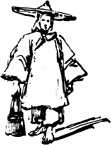
18 - Woman wearing a scarf and tudum
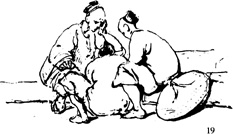
19 - Chess players
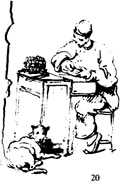
20 - Lottery ticket seller wearing a tunic and shoes with up-turned points
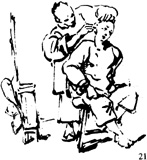
21 - Street barber
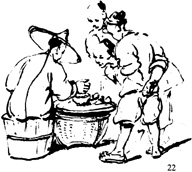
22 - Gamblers
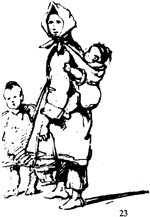
23 - Tankar women with child wearing scarf and padded jacket (1827)
There is certainly some excuse for employing male attendants about the bed chamber and dressing rooms, when it is known that the Chinese 'lords of creation' are the only tailors, dressmakers, washers, ironers and doers-up of fine linen. In Canton, however, there are some women hired by the tailors to do plain sewing, for which they receive nearly as little as our needle workers, and those poor creatures in Great Britain, over whose misery and living death Hood sang his dirge. Their pay is from five to seven cents a day.
The male tailors are somewhat better paid, and will go to any house and work for twelve hours at the rate of twenty-five cents a day, they finding their own food, or, as they call it, their "chow-chow".
It is not uncommon to see a dirty small-footed female sitting at some corner in the street, with a supply of sewing materials and a few rags, ready to stitch up a rent or put a patch upon the garments of any passer-by who may want her services. Toward night she may be seen hobbling home, with her stock in trade, on her disgusting stumps, of which she is seemingly very proud."
FEET BINDING
"All the Chinese women, in fact, pride themselves very much on their goat-like hoofs, and have the greatest possible contempt for a natural foot. Little girls are said to importune their mothers with tears in their eyes to compress their feet as promising them a higher position in society, although the females of the lower orders are frequently observed with the aristocratic hoof, although these are those who have possibly seen better days. It is difficult for strangers to get a sight of these singular deformities, as the Chinese women manifest the greatest reluctance to show them; but Dr. Parker prevailed upon a girl of thirteen, who was a patient in his hospital, to unbandage in the presence of her mother, in order to satisfy the curiosity of the Commodore, who had quite enough in one glance of that shapeless stump, which appeared more like a specimen of bad surgery, such as Dr. Parker would have been doubtless ashamed of, than, as the Chinese considered it, an elegance of fashion.
These horrid hoofs are carefully looked after by the Chinese women, and are swathed in gay bandages of all colours, and shod with a high heeled shoe, richly worked and adorned."
DRESSMAKERS
"A fashionable ladies' dressmaker in China, where all these indispensable servitors of fashion are males, is always greatly in demand among the foreign ladies, and it is as necessary to bespeak his services in time at Canton and Macao as it is those of a Miss Lawson in New York. These man-milliners generally require what they call a "muster", or pattern, which they, with the usual Chinese imitative skill, reproduce exactly, whether of London, Paris or New York fashion, and adapt it to any form or size. It was by no means an agreeable sight, on passing one of the dark and dirty tailor shops at Macao, to behold the greasy and half naked Chinaman, late at night, busily plying his dirty fingers about a splendid female dress, destined to drape the graceful form of some beautiful woman at the coming ball or dinner party. These male dressmakers are held in such estimation by those resident in China, that a few European and American ladies have been known, on leaving the country, to take away a China man-milliner with them.
The ordinary compensation for all operatives in Canton, who find their food, varies from twelve to twenty cents a day. Farm hands, when fed, receive six cents for twelve hours work, being at the rate of a farthing an hour. The day laborers, chair bearers, and porters, if not hired by the job, are paid from twenty to twenty-five cents. Boatsmen's wages are from one and a half to two and a quarter dollars per month, when found, which latter condition generally includes food, not only for themselves, but for their wives and children, who live with them in the boat.
BEGGARS
Porters, and those of other crafts in Canton, form themselves into guilds, and appoint leaders, or headmen, who contract for labor of various sorts. This system of organization is not confined to those who work, but extends to those who beg. The beggars, like the gypsies, have their kings, who assign to their ragged subjects their particular offices of vagabondage and their respective fields of operation; and what is singular, the laws of China secure to these rogues certain rights and privileges.
These laws give to them the right to approach and knock at the door of any domicile, or to enter the shops, and there to strike together a couple of sticks similar to those used by the watchmen employed by families to guard their premises against thieves; these sticks produce a disagreeable sound, and, however long the beggars keep up this annoyance, they cannot be legally ejected until they are paid the usual gratuity, which is the smallest coin in use, termed a "cash", and which in value is about the twelfth of a cent. When supplied with this the beggar takes his departure, and repeats the stick striking nuisance next door, and so on until he has completed his daily circuit.
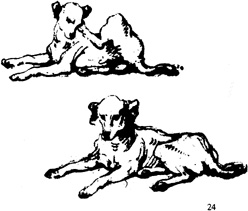
24 - Dogs
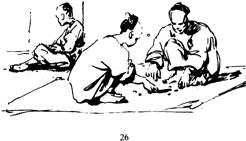
25 - Gamblers (1835)

26 - Boy with a basket
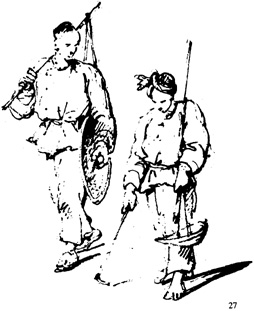
27 - Fisherman and rubbish collector
It is said that one hundred of these mendicants are assigned by their king to Old China street alone, which is altogether occupied by wealthy shop keepers. Some of these commute with the beggars, by paying them a round sum for exemption from the annoyance of these noisy visitors; others refuse to do this, and hold out as long as their patience will allow, with a view to wasting the time of the suppliant, who, having a right to visit all the shops, desires to make the greatest number of calls possible in the course of the day, and thus be able to pay into the general treasury at night the largest amount of "cash".
The organized beggars have their own benevolent institutions, where provision is made for the sick and the needy and the old and the infirm. The number of these well disciplined gentry can hardly be estimated by a stranger, but it is undoubtedly very large, if we may judge from the crowds which infest those parts of the city of Canton accessible to foreigners.
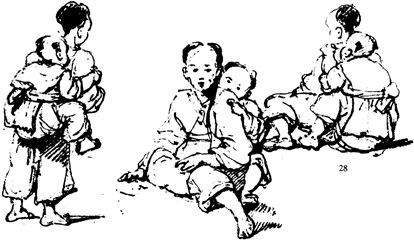
28 - Chinese children
Each city has its own laws with respect to mendicants, and its own charitable institutions. In Canton there are four principal benevolent establishments: one for widows, another for foundlings, a third for furnishing coffins for the dead relations of indigent families, and the fourth for "loafers". They are all, however, so badly managed, that they answer very indifferently the purpose intended, for it happens very generally in China, as is too often the case in Christianized counties, that those who have control of these institutions contrive to embezzle the revenues, and thus make themselves rich by taking care of the poor. Whether thieving is one of the recognized functions of these beggars or not, is not known; but it is quite clear that they can and do turn their hand with great skill to occasional small pilfering, in which they show themselves as great adepts as the most accomplished pickpockets in any part of the world."
Translated by Marie Imelda MacLeod
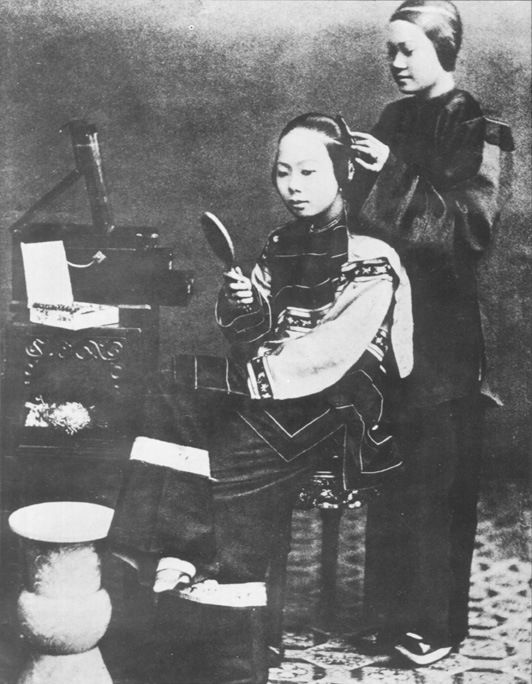
Opposite High class Chinese woman with maid (c 1868). Her "gilded lotus" (bound foot) is visible. Photograph attributed to John Thomson. (Taken from The Face of China as Seen by Photographers and Travelers, 1860-1912 (ed. Aperture Inc.), catalogue of the exhibition at the Philadelphia Museum of Art, 1978.)
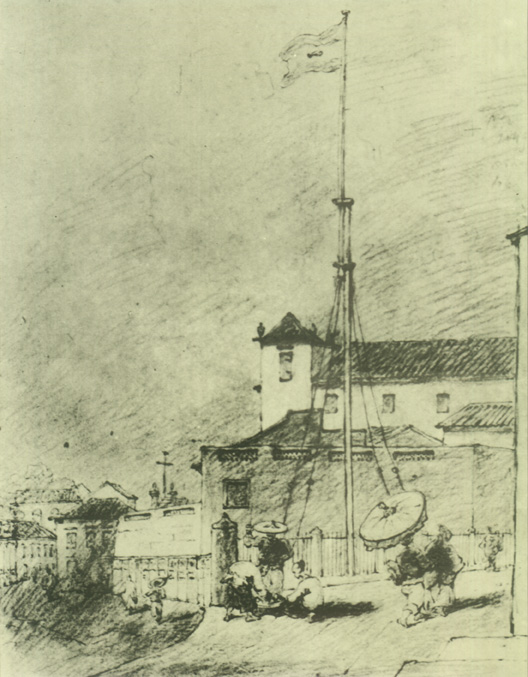
S. Lourenço Church-George Chinnery (ink on paper). In the foreground there are two typical social types from the eighteenth century: gamblers, and a lady wearing a "do" with a servant carrying a parasol.
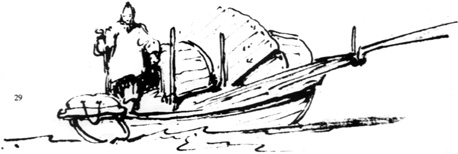
29 - Ferrywoman in her sampan
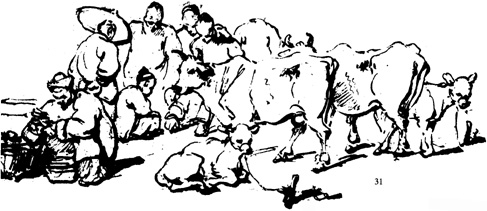
30 - Group of peasants with cattle (engaged in gambling)
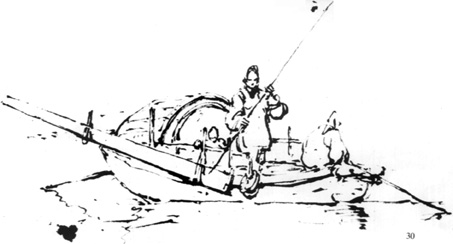
31 - Ferrywoman working in her sampan
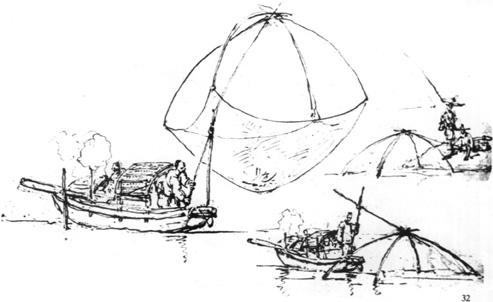
32 - Fishing boats and fishermen engaged in traditional fishing
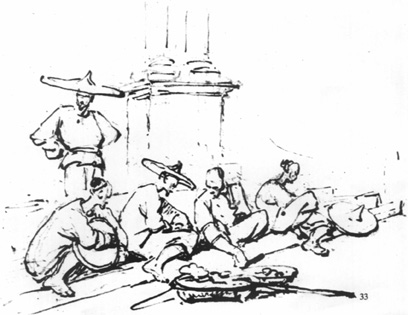
33 - Group of peasants on the steps to S. Domingos
* Historian of Macau, the Portuguese and the Church in the East, author of over one hundred books and member of several international organizations such as the International Association of Historians of Asia.
start p. 15
end p.